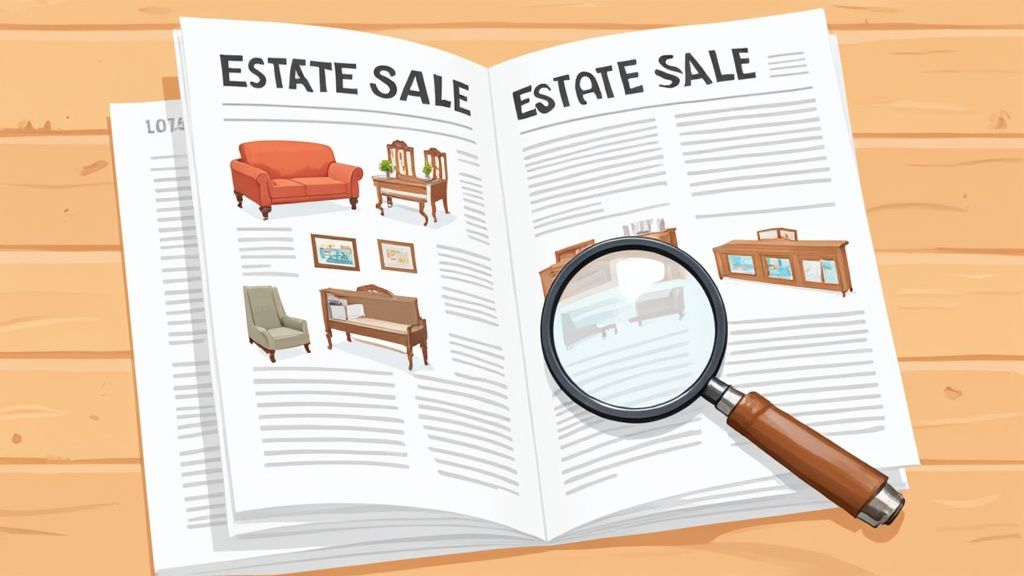Your Digital Estate Sale Discovery Hub
Your smartphone is your secret weapon in the treasure-hunting game. While many people might just browse general marketplaces, the real pros use specific digital tools to get the jump on estate sales before everyone else knows about them. It’s all about knowing where to look and setting up your searches to be as effective as possible. Forget aimless scrolling; it's time to use dedicated platforms and smart alerts that bring the best sales straight to you.
Mastering the Top Estate Sale Platforms
The first place any modern estate sale hunter should look is a dedicated listing website or app. These are the hubs where professional liquidators post their upcoming sales, complete with detailed descriptions and—most importantly—photos. Learning to scrutinize these photos is a skill in itself. Often, the best finds aren't in the spotlight. A blurry background might hide a sought-after mid-century modern lamp or a stack of first-edition books. My personal strategy involves making a list of sales in my favorite zip codes and noting key items, opening times, and payment methods.
To give you a head start, here's a quick comparison of the most popular platforms out there. Each has its own strengths, so it's worth getting familiar with a few.
| Platform | Coverage Area | Key Features | Best For | Cost |
|---|---|---|---|---|
| EstateSales.net | Nationwide (U.S.) | Massive database, company directory, email alerts, photo galleries, online auctions. | Comprehensive local sale discovery and professional company research. | Free for buyers. |
| EstateSales.org | Nationwide (U.S.) | User-friendly map search, detailed listings with photos, "Treasure Tracker" alerts. | Visual searchers who prefer map-based browsing and specific item alerts. | Free for buyers. |
| Everything But The House (EBTH) | Nationwide (U.S.) | Online-only auctions, curated collections, all items start at $1, shipping available. | Finding unique, vetted items from across the country without leaving home. | Free to browse; buyer's premium on purchases. |
| Craigslist | International | Localized listings, direct contact with sellers, wide variety of "sale" types. | Finding smaller, independent sales that might not be on major platforms. | Free for buyers. |
These platforms are becoming more important every year. The way we find estate sales is changing, with many high-end sales now happening on specialized online sites. Industry analysis shows that a significant portion of luxury property liquidations will soon feature virtual tours and interactive listings, with over 60% of buyers already starting their search online.
Don't just stick to the big national databases. Regional sites and even Craigslist can be goldmines. While Craigslist can feel like a gamble—sometimes a listing is just a glorified garage sale—smaller, independent estate sale companies often use it to advertise. These can be hidden gems with less competition. I recommend setting up alerts for terms like “estate sale,” “tag sale,” and “downsizing sale” to make sure you never miss a local opportunity. Casting a wide but targeted net is the key to successful searching.
Building Your Local Intelligence Network

While apps and websites are a great starting point, the most incredible estate sales are often the ones that never get a public listing. The real secret to finding estate sales like a seasoned pro is to step away from the screen and start building genuine local connections. Veteran pickers know that a quiet word from an estate sale company, a local attorney, or even a funeral director can lead to tips about upcoming liquidations weeks before anyone else knows.
Developing these relationships is an art. It's all about being a reliable, respectful buyer—not someone who comes across as pushy or opportunistic.
Forging Insider Connections
Your main goal is to become a known, serious buyer that liquidators want to call first. A great way to start is by becoming a regular, friendly face at sales run by the same few companies in your area. When you make a purchase, especially a significant one, be professional and polite. A simple comment like, "This was a fantastic sale, I really appreciate how you run things," can make a lasting impression.
This shows you respect their hard work and their business. After a few positive interactions, you can casually ask if they maintain a VIP list or offer early notifications for preferred customers. This isn't just about finding more sales; it's about getting a first look at the highest-quality ones.
Positioning Yourself as a Top Buyer
Being a buyer that companies want to work with involves more than just spending money. It’s about being decisive, paying without any fuss, and managing your own logistics smoothly. If you buy a heavy piece of furniture, show up at the designated time with the right vehicle and enough help to move it yourself. That kind of reliability makes you stand out.
It also helps to have a specialty. If a liquidator knows you're the go-to person for vintage audio equipment, you'll be the first person they call when they come across a rare collection. To make confident offers on the spot, you can learn more about the value of your potential finds with our guide on antique appraisal costs.
This kind of strategic networking isn't just a local trick; it reflects trends in high-end global markets where connections are everything. In fact, over 50% of major estate sales now involve some form of detailed data analysis, and more than 30% of serious buyers rely on market intelligence to uncover opportunities. By building your local network, you're essentially creating your own personal, invaluable intelligence source.
Reading The Signs: Spotting Hidden Opportunities
 While apps and websites are fantastic, some of the most rewarding finds come from going a bit old-school. Seasoned treasure hunters know that the best opportunities often whisper, they don't shout. It's about learning to spot the subtle clues in a neighborhood that signal a sale is on the horizon, often before it's ever advertised online.
While apps and websites are fantastic, some of the most rewarding finds come from going a bit old-school. Seasoned treasure hunters know that the best opportunities often whisper, they don't shout. It's about learning to spot the subtle clues in a neighborhood that signal a sale is on the horizon, often before it's ever advertised online.
Think of it as putting on your detective hat. You start to notice the little things. For example, a home in a mature neighborhood that's always been perfectly manicured suddenly has an overgrown lawn or a stack of newspapers on the porch. These signs can indicate a change in the household, which frequently leads to an estate sale.
Tapping into Community Channels
Your local community is a goldmine of information, often revealing sales long before they appear on major listing sites. You just need to know where to look.
- Neighborhood Social Media Groups: Keep an eye on local Facebook groups or the Nextdoor feed. A family member might not use the term "estate sale" but will post about a huge "moving sale" or "downsizing sale." These are often the same thing, just without a formal company involved, meaning less competition for you.
- Community Bulletin Boards: Don’t underestimate the power of a physical flyer. Check the bulletin boards at your town library, community center, or even the local grocery store. You’ll often find handwritten notices for sales that are never posted anywhere else online.
- Reading Local News and Obituaries: This method requires a delicate and respectful touch. Obituaries in the local paper or on funeral home websites can sometimes hint at a future sale of personal property. The key here is patience and respect. Never contact a grieving family directly. Instead, simply make a note and watch for an official sale announcement from a liquidator in the weeks that follow.
By blending on-the-ground observation with a respectful look at local announcements, you can get a serious head start. This boots-on-the-ground approach is a classic for a reason—it helps you uncover those truly unique sales with far fewer people around.
Strategic Timing and Geographic Intelligence
Knowing how to find estate sales is one thing, but knowing when and where to look is what really sets the pros apart. It's about learning the seasonal rhythms of the market and developing a bit of geographic smarts. Mastering this can be the difference between happening upon the occasional good find and consistently scoring amazing treasures.
Understanding the Estate Sale Seasons
Just like retail, the world of estate sales has its own distinct high and low seasons. Savvy shoppers know these patterns and use them to their advantage. For instance, springtime, from about March to June, is usually booming with sales. This isn't just a "spring cleaning" phenomenon; it's also a hot time for the real estate market, which leads to more downsizing and moving sales packed with household goods and patio furniture.
On the other hand, the stretch from Thanksgiving through New Year's is famously slow. Most families are focused on the holidays, not on liquidating an estate. But here's a pro tip: any sales that do happen during this quiet time can be absolute goldmines with way less competition. Things usually pick back up in January and February, as families and liquidators get moving on decisions made over the holidays.
To get a better handle on these trends, it helps to see how the year typically plays out.
Estate Sale Seasonal Patterns
Here's a breakdown of what you can generally expect each month, from sale frequency to the types of items you're likely to find.
| Month | Sale Frequency | Common Items | Competition Level | Best Strategies |
|---|---|---|---|---|
| Jan-Feb | Moderate | Household goods, indoor furniture, leftover holiday decor. | Low to Moderate | Be persistent. Fewer sales mean less choice, but also less competition for what's available. |
| Mar-Apr | High | Garden tools, outdoor furniture, spring cleaning clear-outs, full estates. | High | Arrive early. This is peak season, so expect crowds. Prioritize your route. |
| May-Jun | Very High | Everything from furniture and decor to tools and collectibles. | Very High | Be selective. With so many sales, focus on high-potential neighborhoods and sales with promising photos. |
| Jul-Aug | Moderate | Leftover spring inventory, downsizing sales before the school year. | Moderate | Look for deals. Liquidators may be eager to clear out inventory before the fall slowdown. |
| Sep-Oct | High | Fall decor, end-of-season outdoor items, pre-holiday downsizing. | High | Network with estate sale companies. They're busy and might share intel on upcoming sales. |
| Nov-Dec | Low | Small collections, urgent liquidations, some holiday-themed items. | Low | Hunt for hidden gems. The few sales that occur can have incredible finds with few buyers. |
This table shows that while spring is the busiest time, great finds are possible year-round if you adjust your strategy to match the season's unique rhythm.
Mapping Your Treasure Hunt
Beyond timing, your geographic strategy is your best tool. Instead of just driving around hoping for the best, target specific neighborhoods based on some demographic detective work.
- Established, older neighborhoods with a high number of long-term homeowners are fantastic for vintage and antique pieces. Think of those post-war suburbs for finding mid-century modern gems or historic districts for true antiques.
- Affluent zip codes often feature sales with high-end decorative art, designer furniture, and fine jewelry. Prices might be a bit steeper, but the quality can be outstanding. This is where knowing how to find the value of antiques really pays off before you even step inside.
- Up-and-coming areas can be a wild card, offering unique, eclectic items from younger estates or people who have recently moved to the area.
A great weekend strategy is to pull up a digital map and plot your top 3-4 sales. Group them by location to cut down on driving and give yourself more time for shopping. Creating a route that considers opening times and the potential quality of items is a pro move. It gets you to the most promising sales first, giving you the best shot at grabbing the day's best items before anyone else.
Creating Your Collector Community Network
 Once you get good at finding sales, you'll discover a simple truth about the estate sale world: it’s better with friends. The most seasoned shoppers don’t see everyone as competition; they build a community. Shifting your mindset from rival to ally can completely change your weekend hunts and your results. A solid collector network is one of your best assets for discovering sales and scoring specific items.
Once you get good at finding sales, you'll discover a simple truth about the estate sale world: it’s better with friends. The most seasoned shoppers don’t see everyone as competition; they build a community. Shifting your mindset from rival to ally can completely change your weekend hunts and your results. A solid collector network is one of your best assets for discovering sales and scoring specific items.
You can't be everywhere at once, but your network can. These connections often form organically at sales, flea markets, and antique shows. The key is to be friendly and chat with the other regulars you start to recognize.
Sharing Your Way to Success
The heart of a strong collector network is reciprocal information sharing. This isn't about giving away all your secrets; it's a strategic give-and-take. For instance, if you know a fellow regular is crazy about vintage Pyrex and you spot a pristine set, a quick text can make their day. Chances are, when they're at a sale and see the mid-century art pottery you love, they’ll return the favor. It all comes down to building trust and goodwill.
Here are a few practical ways to put this into action:
- Divide and Conquer: When several great sales are happening on the same Saturday morning, team up with a friend. You each hit a different one. If you find something the other would love, you can either buy it for them (if you've pre-arranged it) or send them a heads-up to swing by.
- Specialize Your Intel: Pay attention to what the familiar faces around you collect. I once had another shopper, who knew I was always looking for equestrian art, point out a stunning painting I had completely missed. The next month, I spotted some rare leather-bound books and made sure to let him know.
- Connect Online: Your network doesn't have to be limited to in-person meetups. Niche Facebook groups or online collector forums are fantastic places to meet people who share your passion. You can trade tips on local finds and learn from others' experiences.
Building this community takes time, but the payoff is huge. You’ll not only get leads on how to find estate sales you might have otherwise missed, but you'll also find the whole experience more rewarding. Helping others find their treasures often leads to your own best discoveries.
Advanced Preparation and Success Strategies
Just finding the sale is the first part of the adventure. Showing up ready to go is what separates the casual browser from the seasoned hunter who consistently scores amazing finds. The real work starts before you even grab your keys, and these strategies can make a huge difference when you're figuring out how to shop estate sales like a pro.
Decode Listings and Do Your Homework
Your first mission is to become a detective with the sale listing's photos. Don't just glance at the featured furniture. Look past it. Peer into the corners and backgrounds of every single picture. That blurry shot of a den might reveal a valuable piece of art on the wall, or a jam-packed bookshelf could be hiding a few first-edition books. Seasoned shoppers treat these photo galleries like treasure maps, making a visual checklist of items and guessing where they might be in the house.
It's also worth taking a minute to research the property address. A quick online search can sometimes tell you about the former owner's life, like their job or hobbies, which gives you incredible clues about what you might find. For instance, a retired doctor's estate could have antique medical tools, while a former musician's home might be a goldmine for vintage audio equipment. This bit of sleuthing helps you decide which sales are actually worth your time.
Gear Up for the Hunt
On sale day, what you bring with you can be just as important as how early you get there. My personal kit is simple but has saved me countless times:
- A couple of sturdy tote bags: Many sales don't offer bags, and you'll want your hands free to inspect items without juggling.
- Cash in different bills: While more companies are taking cards, cash is still the fastest way to check out and can sometimes give you a little more power when negotiating.
- A small flashlight and a tape measure: These are lifesavers for checking out items in dimly lit basements or attics and ensuring that gorgeous dresser will actually fit through your door.
- Your smartphone: Use it for more than just paying. It's your on-the-spot research tool to quickly look up an item's value or learn more about its history.
Arriving early is always a good plan, but the day you go is a strategic choice. The first day always has the best selection, but the last day usually has the best prices, with discounts often hitting 50% off. Building a friendly relationship with the estate sale staff can also open doors. A simple, polite question like, "If I come back for this tomorrow, might there be some flexibility on the price?" can give you some great inside information.
Key Takeaways

Jumping into the world of estate sales is an adventure, and knowing exactly where to look is the first real step to finding incredible pieces. Finding success isn't just about getting lucky; it's about mixing smart online research with old-fashioned, on-the-ground scouting and a healthy dose of patience. Your practical roadmap starts by getting good at a few key things.
Your Estate Sale Success Checklist
To hit the ground running, focus on these actionable methods that bring in the best results. You don't have to do everything at once, but building these habits will create a strong foundation for your treasure hunting.
- Digital Diligence: Get your alerts set up on at least two big platforms, like EstateSales.net and another that's popular in your region. Don’t just scroll through the listings—study the photos carefully. You'd be surprised what treasures are hiding in the corners or background of a picture.
- Boots on the Ground: Set aside time for a drive at least once a month to scout out neighborhoods that seem promising. Keep an eye out for the classic signs of an upcoming sale, like an overgrown lawn or a mailbox that's stuffed full.
- Community Connection: At every sale you visit, make it a goal to chat with at least one other regular shopper or an employee. These small conversations, built up over time, can turn into an amazing network for getting inside information.
Setting Realistic Expectations
Remember, you're not going to find a priceless artifact every single weekend. The real fun is in the hunt, and your best asset is persistence. For your first couple of months, don't focus on finding specific items. Instead, set a goal to visit two new sales a month to get a feel for the rhythm of your local market. Measure your progress not just by what you buy, but by the new companies you discover and the people you connect with.
Patience is what really separates a casual browser from a serious treasure hunter. Some days, you'll go home empty-handed, and that is perfectly okay. The real victory is in building the skills that put you in the right place at the right time, consistently.
As you start your journey, one of the most powerful tools you can have is one that helps you instantly understand an item's history and value. The Curio app turns your phone into a portable antiques expert, giving you the confidence to identify treasures on the spot. Download Curio today and turn every find into a story.
